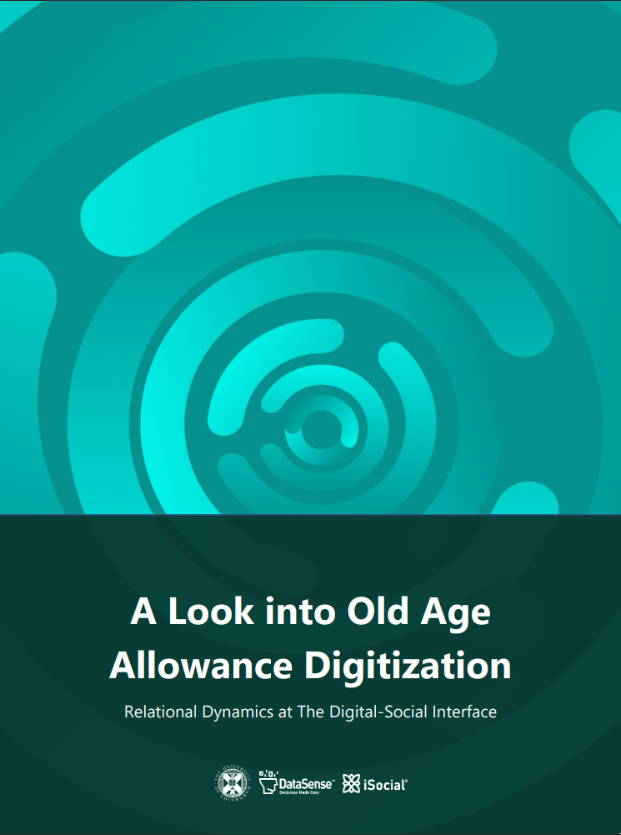To understand the relational dynamics of digital and social interfaces in the context of the digitalization of the Old Age Allowance (OAA) program in Bangladesh, with a focus on identifying both empowerment and exclusionary components.
Project timeline: February 2024 – December, 2024
Partners:
- World Bank
- Bangladesh High-tech Park Authority of ICT Division of Ministry of Post, Telecommunications and ICT
Project objective:
This research project aims to comprehensively examine the official processes and the lived experiences of citizens and service providers in accessing the Old Age Allowance (OAA) program in Bangladesh, following its digitalization. By applying a ‘human infrastructures’ approach, the study seeks to understand how the digital transformation, particularly the integration of mobile financial services and online registration, has reshaped citizen accessibility, equity, and potential for empowerment. Simultaneously, it will critically analyze the new layers of dependency, vulnerabilities (e.g., data breaches, identity theft, financial fraud), and exclusionary components that may have emerged or been exacerbated due to factors like low digital literacy, reliance on intermediaries, and persistent informal influences in the selection process. The research will delve into the entire OAA process, from information ingestion and backend data flows to user experience and enterprising responses to digital exclusions, ultimately providing insights into the sociopolitical consequences of data conceptualization and actionable recommendations for fostering a more inclusive social protection system.
Project outcome:
- Identification of specific ways in which data collection and transformation processes in the digitalized OAA system generate or formalize exclusions.
- Analysis of how backend data flows, decision pathways, security, accessibility, and monetization generate value for different stakeholder groups within the OAA program.
- A clear understanding of how data and its potentials are conceptualized within the digitalized OAA system, and the sociopolitical consequences of this conceptualization.
- Assessment of how the digital service experience has transformed citizen accessibility and equity, and the ways in which digitally mediated relations shape parameters for citizen empowerment.
- Identification of new exclusions produced by the digitalization of OAA and recommendations for addressing them.
- Detailed insights into people’s experiences of accessing and using these digital transformation processes, highlighting existing inequalities that are exacerbated or ameliorated, and new inequalities that emerge.
- Documentation of responses from Social Enterprises (SEs), NGOs, grassroots activists, and individuals to the exclusions generated by OAA digitalization.
- A nuanced understanding of the “human infrastructures” (mediation and advocacy) that ensure or hinder the effective functioning of digital services in the OAA context.
Locations the project served: Nationwide.
Impact:
- Improved Inclusivity of SSN Programs: The findings will directly inform policy and program adjustments to mitigate digital exclusions and ensure that the OAA, and potentially other digitalized SSN programs, genuinely reach and benefit the most socio-economically vulnerable populations.
- Enhanced Beneficiary Protection: By identifying vulnerabilities related to data breaches, identity theft, and financial fraud arising from digital dependency, the research can lead to the development of better safeguards and recipient education programs.
- More Equitable Service Delivery: A deeper understanding of the interplay between digital and social interfaces will enable the government to design more citizen-centric digital services that account for varying levels of digital literacy and access.
- Strengthened Accountability and Transparency: By shedding light on informal intermediaries, potential for corruption, and non-compliance with eligibility criteria, the research can contribute to strengthening accountability mechanisms in the selection and disbursement processes.
- Informed Policy-making for Digital Transformation: The study will provide valuable lessons for future digitalization initiatives within public services in Bangladesh, offering a framework for anticipating and addressing potential social and economic consequences.
- Empowerment of Vulnerable Citizens: By addressing the challenges of digital literacy and dependency, the project aims to contribute to greater autonomy and control for OAA recipients over their allowance and personal data.
Download Report:
SSNP Digitization Report_The New Data Economies of Social Enterprise_iSocial

